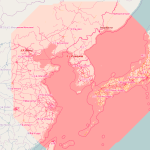Haksoon Paik observes that over the past months, Kim Jong Un has displayed several new leadership styles characterized by more openness and transparency, which could potentially lead to reform. Paik notes that Kim Jong Un’s new leadership style “seems to have attained popularity among North Koreans…[his] imitation of his grandfather’s style also appears to have given people hope for a better future, reminding them of “those old good days” of the Kim Il Sung era…”. Paik concludes that it is inevitable, under the circumstances, for Kim Jong Un’s policies to be as independence (juche)-seeking, military-first and defensive against external security threats as his predecessors’, but that Kim Jong Un shows signs of being more sensitive and responsive to the demands of the people from below in the domestic realm.
Haksoon Paik is the Director of Inter-Korean Relations Studies Program and the Director of the Center for North Korean Studies at the Sejong Institute, an independent think tank in South Korea.


